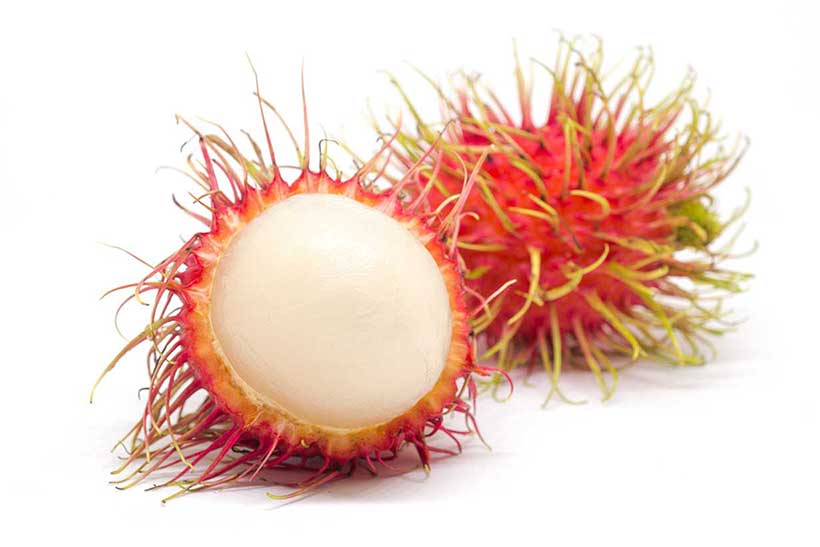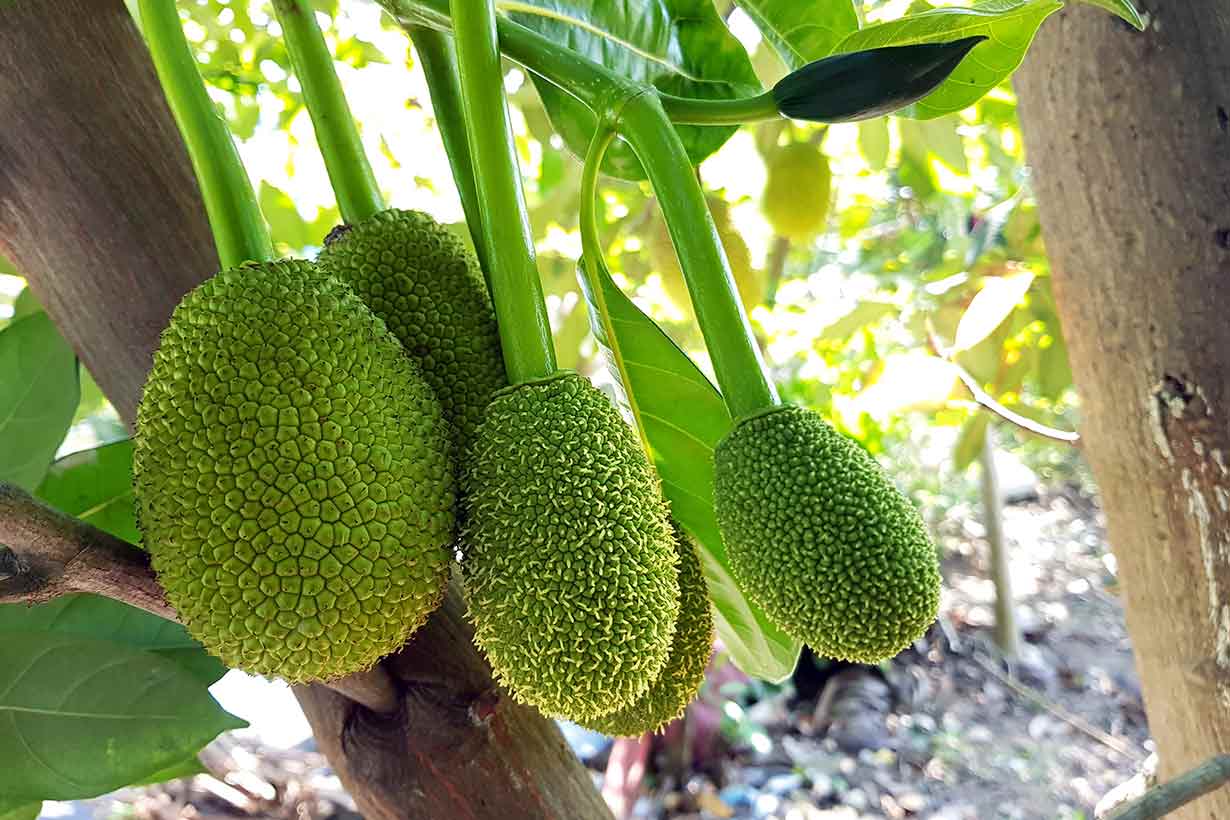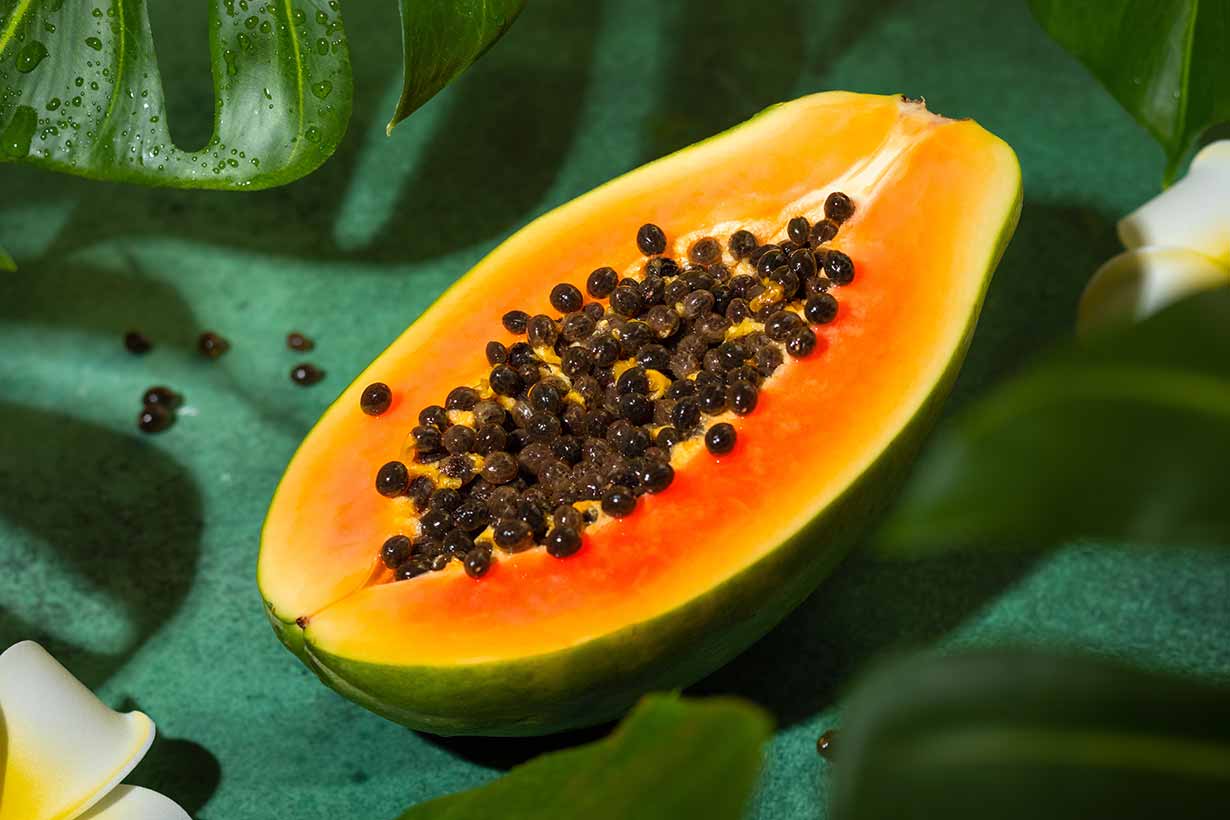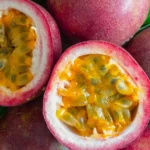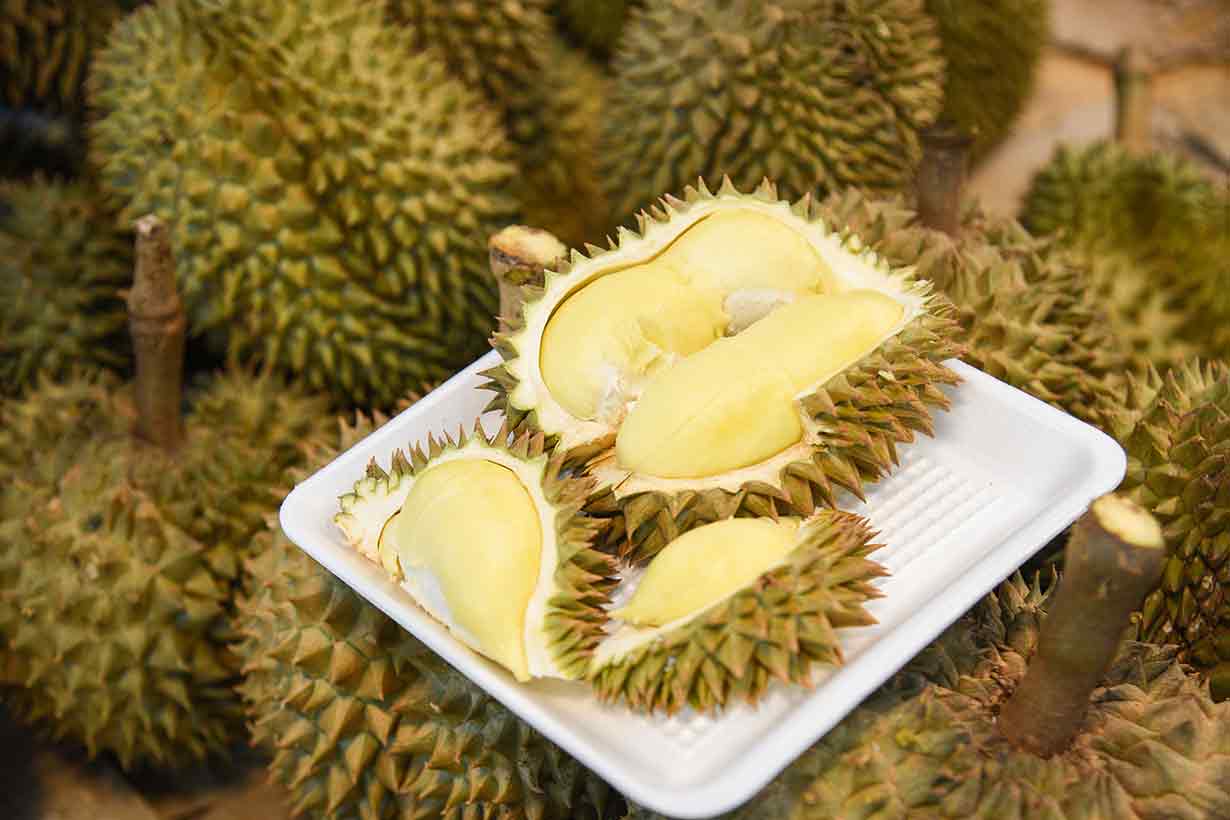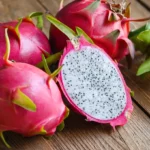Pineapple is among the most popular tropical fruits, and it’s incredibly versatile.
You can find this fruit in everything from fruit salads and juice to cooked dishes—even as a (controversial!) pizza topping.
But what exactly does pineapple provide in terms of nutritional value? And does it have any confirmed health benefits?
This article provides an evidence-based guide to the nutritional properties of pineapple.
Key Nutrients
Here are the key nutrients you’ll find in a 165-gram cup of pineapple chunks:
- Calories: 83 kcal
- Carbohydrate: 21.6 g
- Fiber: 2.31 g
- Sugars: 16.3 g
- Vitamin C: 88% DV
- Manganese: 67% DV
- Plant compounds: Bromelain, phenolic acids (polyphenols), quercetin
Source: USDA data
Percent daily values (% DV) are based on a 2,000 calorie diet.
Table of contents
5 Potential Health Benefits
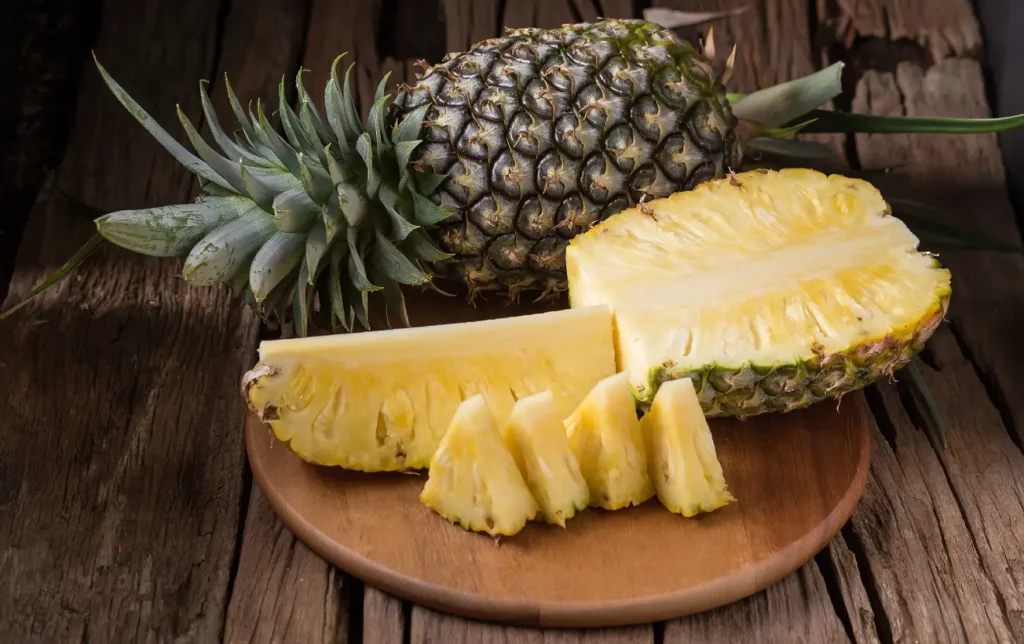
In this section, we’ll examine both the known and potential health benefits of pineapple, looking at what evidence supports each benefit.
Pineapple Provides a Beneficial Enzyme Called Bromelain
Pineapple is a unique dietary source of bromelain, an enzyme not found naturally in other foods (1).
One of the primary effects of bromelain is its protein-digesting properties (2). It does this by breaking down proteins into amino acids.
Interestingly, this may be why Brazilian steakhouses traditionally serve pineapple as part of a churrasco meal.
However, we should urge caution when viewing pineapple as a potential digestive aid, as there is very little available research in this area.
There is just one small human trial that showed approximately 500 mg of bromelain per day improved fat and protein digestion in 12 adult participants with pancreatic insufficiency (3).
Pineapple juice contains approximately 0.43 grams (430 mg) of bromelain per 100 ml (4).
More research is necessary to support claims about pineapple improving digestion.
Canned Pineapple Contains Little Bromelain
It is also worth noting that canned pineapple has an extremely low bromelain content.
This is because bromelain is a heat-sensitive enzyme, and commercial canning processes use high-heat treatment to sterilize canned foods.
Research demonstrates that heating pineapple at 67 °C (152 °F) for 5 minutes inactivated bromelain activity (5).
Canned fruits such as canned pineapple are typically heated to the same temeprature as boiling water to kill bacteria (6).
Therefore, anyone considering pineapple for its bromelain content should opt for raw, fresh pineapple.
Pineapple Is Among the Best Dietary Sources of Vitamin C
A 165-gram cup serving of pineapple chunks provides 78.9 mg of vitamin C, which is 88% of the daily value for vitamin C (7, 8).
With just a cup serving meeting nearly 100% of the daily value, pineapple is one of the most vitamin-C-rich foods.
Vitamin C has many beneficial attributes, and maintaining a sufficient intake can help to (9):
- Keep cells healthy and protect them against oxidative damage.
- Enhance the absorption of non-heme iron—the type of iron found in plant-based foods.
- Support the immune system—potentially lowering the severity of colds.
- Keep skin healthy through its role in collagen production.
Pineapple Juice May Improve Recovery From Cosmetic Surgery
A randomized controlled trial involved 100 participants undertaking facial cosmetic surgery (10).
Fifty of these participants consumed two servings of 350 ml of pineapple juice each day for two weeks—700 ml in total: for seven days prior to surgery and seven days after
The other fifty participants followed standard care instructions and consumed no pineapple juice.
The study found that the pineapple group showed reduced facial swelling, less skin discoloration, and reduced post-surgical pain (10).
The reseachers attributed these results to the bromelain content of pineapple juice.
Significant Manganese Content
In addition to being a top dietary source of vitamin C, pineapple is also rich in manganese.
A 165-gram cup serving of pineapple chunks offers 1.53 mg of manganese, approximately 67% of the daily value (7, 8).
Manganese plays vital roles in (11, 12):
- The body’s antioxidant system, helping to protect cells against damage.
- Promoting optimal bone formation.
- Converting dietary carbohydrates and fat into energy.
- Promoting protein synthesis—turning dietary proteins into muscle.
What Is the Nutritional Profile of Pineapple?
The following tables presents the complete nutritional values of raw pineapple per 100 grams. Data is sourced from the USDA FoodData Central database (7).
Calories and Macronutrients
| Nutrient | Amount | % Daily Value |
|---|---|---|
| Calories | 50 kcal | |
| Carbohydrate | 13.1 g | 5% |
| Fiber | 1.4 g | 5% |
| Sugars | 9.85 g | |
| Fat | 0.12 g | <1% |
| Saturated fat | 0.01 g | <1% |
| Unsaturated fat | 0.05 g | |
| Monounsaturated fat | 0.01 g | |
| Polyunsaturated fat | 0.04 g | |
| Omega-3 | 0.02 g | |
| Omega-6 | 0.02 g | |
| Trans fat | 0 g | |
| Protein | 0.54 g | 1% |
| Cholesterol | 0 mg | 0% |
Vitamins
| Vitamin | Amount | % Daily Value |
|---|---|---|
| Vitamin A, RAE | 3 mcg | <1% |
| Thiamin (B1) | 0.08 mg | 7% |
| Riboflavin (B2) | 0.03 mg | 2% |
| Niacin (B3) | 0.5 mg | 3% |
| Pantothenic acid (B5) | 0.21 mg | 4% |
| Vitamin B6 | 0.11 mg | 6% |
| Folate | 18 mcg | 5% |
| Vitamin B12 | 0 mcg | 0% |
| Vitamin C | 47.8 mg | 53% |
| Vitamin D | 0 mcg | 0% |
| Vitamin E | 0 mg | 0% |
| Vitamin K | 0.7 mcg | <1% |
Minerals
| Mineral | Amount | % Daily Value |
|---|---|---|
| Calcium | 13 mg | 1% |
| Copper | 0.11 mg | 12% |
| Iron | 0.29 mg | 2% |
| Magnesium | 12 mg | 3% |
| Manganese | 0.93 mg | 40% |
| Phosphorus | 8 mg | 1% |
| Potassium | 109 mg | 2% |
| Selenium | 0.1 mcg | <1% |
| Sodium | 1 mg | <1% |
| Zinc | 0.12 mg | 1% |
Pineapple vs Pineapple Juice
As with other fruit juice options, pineapple juice contains many of the same beneficial aspects of whole, fresh pineapple. This includes the vitamin C and manganese content as well as bromelain, and polyphenols, including phenolic acids and quercetin.
However, many commercial pineapple juice products are pasteurized (heat-treated) to kill bacteria. This may significantly decrease bromelain and vitamin C content.
Heat can inactivate bromelain (5), and studies show that juice pasteurization can lead to vitamin C losses of 2-47%, depending on time and temperature (13).
Pineapple juice products should list their vitamin C content.
Another key difference between whole pineapple and pineapple juice is fiber. While 100 grams of pineapple provides 1.4 grams of fiber, 100 grams of pineapple juice contains only 0.2 grams (7, 14).
Frequently Asked Questions
With approximately 9.85 grams of sugar per 100 grams, pineapple is a moderate source of fruit sugars compared to other fruit. While it contains more sugar than fruits like raspberries and strawberries, it has significantly less than cherries, grapes, and mangoes (15, 16, 17, 18, 19).
Although some sources list “anti-inflammatory properties” as a benefit of pineapple, there is no consistent evidence from human trials to support this. Numerous human trials have examined the potential for bromelain—the enzyme contained within pineapple—to have anti-inflammatory effects. However, a systematic review of seven human trials found that the evidence for benefit was inconsistent (20). Therefore, the current evidence does not support pineapple having anti-inflammatory effects.
It’s possible pineapple may aid digestion, but outside of one small study on bromelain supplementation, there is no strong evidence to support this claim.
Pineapple is versatile. It can be eaten alone, added to a fruit salad, blended into a juice or smoothie, or cooked.
Small chopped pieces of pineapple sometimes feature in mild, fruity curries. The traditional Brazilian churrasco pineapple is sliced into long, thick strips, dusted with a bit of cinnamon, and grilled until hot.
Yes. Bromelain and vitamin C are both heat-sensitive. Cooking pineapple will reduce bromelain and vitamin C content, depending on temperature and cooking time.
While pineapple doesn’t contain as many polyphenols as berries, it does provide some. The fruit’s polyphenol content includes various phenolic acids and a small amount of the flavonoid quercetin (21, 22). Diets high in polyphenols are associated with long-term health benefits (23).
Summary
Pineapple is a delicious tasting fruit that adds a large amount of vitamin C and manganese to the diet. It also contains compounds like bromelain and polyphenols, which may offer benefits.
However, there is little strong evidence to support any specific health claim about pineapple consumption.
If you enjoy pineapple, then it can be a great dietary inclusion—as can many other fruits.
For more on fruit, see this guide to the nutritional properties of 50+ fruit varieties.

